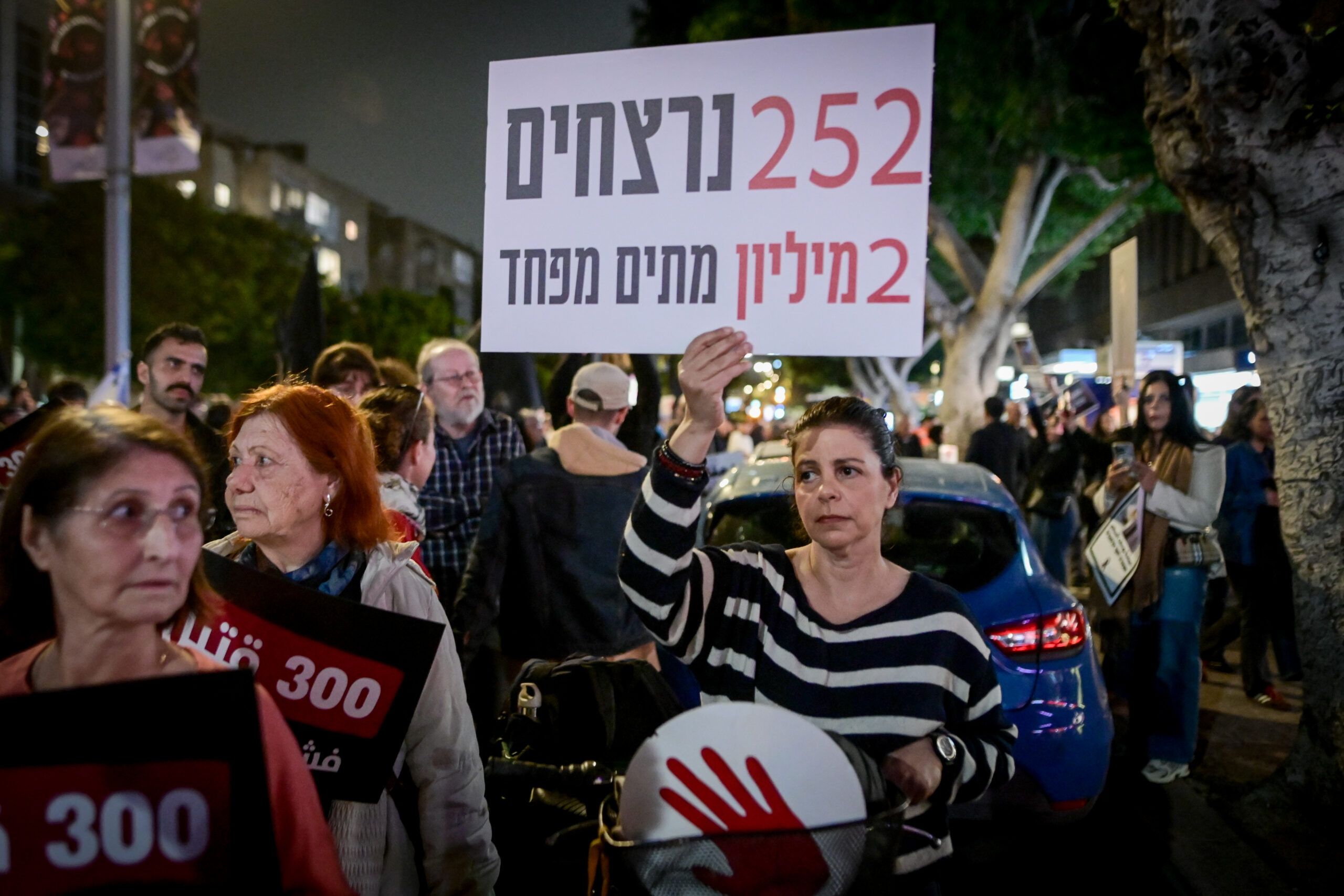Your Daily Phil: ROI Impact Summit to return in September
Good Wednesday morning.
In today’s edition of Your Daily Phil, we report on Monday’s episode of “Get Your Phil,” in which Steve Weil, CEO of the Friends of the Israel Defense Forces, discussed his organization’s stepped-up efforts since Oct. 7, and feature an opinion piece by Sarah Levin about incorporating the Jewish experience in the Middle East and North Africa into discussions, materials and programming about antisemitism. Also in this newsletter: Gregg E. Gardner, Rose Lubin and Rabbi Raleigh Resnick. We’ll start with the planned return of the ROI Impact Summit later this year.
When the ROI Impact Summit that was scheduled for December — only the second such gathering since the start of the COVID-19 pandemic — was canceled because of the ongoing war between Israel and Hamas, Lena Bakman, a member of the ROI Community, was not surprised. “It was obvious it would be canceled,” Bakman, a former parliamentary assistant in Israel’s Knesset, told Jay Deitcher for eJewishPhilanthropy. “A lot of people have waited for the summit… but everyone understood.”
Even though Bakman said it was a disappointment, especially since she has new candidates to recommend to join the community, she was proud of how the existing members came together, supporting each other’s initiatives during such a difficult time. “After Oct. 7, we’re a family, and wherever, whoever, needs help, we are there to support,” she said.
But now planning is underway for a new summit that will be held in September with a focus on war relief and recovery. Existing ROI members, like Bakman, will also be able to recommend new candidates to attend and join the community.
“Since the start of the Iron Swords War, our community has stepped up to tackle the unprecedented challenges emerging in Israel and in Jewish communities around the world,” Beri Rozenberg, co-director of ROI Community, told eJP via email. “Some members have been on the front lines of the Israel advocacy battle, fighting misinformation and anti-Israel content online and in person. Others have been prioritizing the plight of the hostages, creating awareness campaigns and events to keep this issue at the forefront of the global agenda. Yet others have dedicated themselves to supporting Israel’s evacuees through relief activities, logistical support and more.”
A project of the Charles and Lynn Schusterman Family Philanthropies, the ROI community — ROI standing for Return on Investment — is a network of 1,700 Jewish activists and social entrepreneurs from more than 60 countries who often partner on for initiatives. One of the core aspects of the program is the yearly five-day summit held in Jerusalem, which normally welcomes between 120 to 150 new members ages 25 to 40 from around the globe. Since the pandemic hit in 2020, only one summit has been held.
ROIer Diego Goldman, the director of LAZOS, an organization that connects young Latin American Jews, told eJP that even without the summits, being connected to the ROI Community continues to help his organization grow because it offers him connections across borders that he never would have had. “People want to do business with New Yorkers, not with people in Bogota, Colombia,” he said. But ROI linked him to leaders across the world, who often share their expertise with him and support his work.
“Especially in this time, ROI plays an important role in connecting and empowering Jewish and Israeli leaders globally, which is especially crucial given the growing challenges in Israel in the diaspora,” Elad Caplan, an ROI member who runs initiatives funded by Schusterman Family Philanthropies, told eJP. “With rising antisemitism and threats to Jewish communities and Israel’s security, a strong network of Jewish leaders who learn and support each other is essential.”
Q&A

Friends of the Israel Defense Forces expects to donate some $90 million toward mental health-related projects for soldiers and veterans, the organization’s CEO Steve Weil told eJewishPhilanthropy’s Judah Ari Gross in the latest episode of the “Get Your Phil” interview series this week.
An impending epidemic: These projects include a recent $24 million donation to expand the mental health services provided by the Sheba Medical Center outside of Tel Aviv. The organization is also constructing a facility in the coastal city of Netanya that will offer therapy to soldiers and veterans, as well as “resilience” training for troops, which is expected to cost at least $35 million; and it is funding “SOULdier Recharge” programs, in which soldiers coming off the front lines are given a few days to rest and recuperate, Weil said. These calm periods after battle also give mental health professionals an opportunity to do early screening and identify soldiers who show warning signs of post-traumatic stress disorder. “The [Defense Ministry] is expecting that anyone who’s done frontline service — we’re looking at 15% of them will have acute PTSD and on top of the acute PTSD up to another 30% will have mild PTSD,” Weil said.
Don’t say no: According to Weil, FIDF made a decision in the early days of the war to “not say no” to requests from the IDF and Israel’s Defense Ministry. “When the war came, that Monday I called a board meeting, and in that board meeting, we made a decision: This is a war. This is existential. In a war, you don’t say no,” Weil said. “Not only that, we took zero overhead. Every penny that went to the emergency campaign is transferred to the army for the benefit of the soldiers. We’re not going to say no. We haven’t said no to this day.”
A lot but not enough: To accomplish all this, it has stepped up its fundraising efforts considerably, growing its donor base “four-fold,” Weil said, though he declined to share how much the organization had raised until the figures have been audited. “I would say that we have seen — and we’re not the only ones — an incredible generosity. I’m not sure American Jews have been this generous since the Yom Kippur War. And the kind of generosity, the kind of support, the kind of empathy that we’re seeing has just been incredible,” he said. “As much as we’re raising, we don’t have the funds to cover the needs of this war,” he said. “And the reality is… we’ve trained the staff to say this to our donors: If there’s a war with Hezbollah, we’re going to have to come back a second, a third, a fourth time.”
THE JEWISH EXPERIENCE
Empowering Sephardic perspectives as we navigate antisemitism in education

“For numerous Jews originating from Arab and Muslim nations, the introduction of antisemitism into classrooms marked the initial signifier of their eventual ethnic cleansing. This pattern of antisemitism within public school systems is not a remote relic of the past – it’s unfolding here and now,” writes Sarah Levin, executive director of JIMENA: Jews Indigenous to the Middle East and North Africa, in an opinion piece for eJewishPhilanthropy.
Boost civic engagement: “Thankfully, unlike former Jewish refugees from Arab and Muslim countries, Jewish Americans are afforded civil rights protections on the basis of shared ancestry and nationality… Instead of solely engaging with schools and districts when issues of antisemitism arise, we should be far more proactive by building trusting relationships with them and offering to collaborate and educate. It is essential to find ways to empower and enable Jewish parents to actively participate on school boards and city councils, fostering renewed Jewish engagement in civic life. Therefore, we need mechanisms to train members of our community in how to get engaged in civic life.”
So relevant, so overlooked: “We must collectively commit ourselves to broadening our understanding of antisemitism education and activism beyond the Holocaust and oppression in Eastern Europe. In order for us to navigate the current rise of antisemitism happening not only here but around the globe, it is critical for Jewish organizations to learn about and internalize the histories and experiences of the one million Jewish refugees from North Africa and the Middle East and apply those lessons to every element of our work to combat antisemitism in the school system and beyond. There is incredible power in sharing these histories and experiences with the larger public, and it is incumbent upon all Jewish organizations working in this space to do so.”
Worthy Reads
A Different Mindset: In an article for TheTorah[dot]com, scholar Gregg E. Gardner observes a difference between charity as the word is commonly conceived and the acts of charity mandated in the Torah. “The agricultural allocations for the poor outlined in Leviticus and Deuteronomy are a series of negative commandments, in which God forbids Israelite householders from gathering some of their produce and requires them to leave it for the poor… The obligations here are all passive, lacking agency: He is to leave the produce in the field and vineyard for the underprivileged to collect… The landowner is not asked to actively hand over or distribute anything of his own – especially not in the way that an individual will be instructed to give charity from his or her own pocket in later Jewish texts… Although the agricultural allocations to the poor share some characteristics with charity, they function differently. Charity is a positive duty whose underlying premise is that it comes from one’s own personal property and the benefactor exercises some discretion over what is given and how… The biblical laws of harvest allocations, in contrast, have traits that are typically characterized as acts of justice… Both in the biblical text and their later interpretations by the rabbis, the laws of harvest-time allocations center on the principle that humans neither own the land nor its produce outright. Rather, a portion of the harvest belongs to God, which in turn God allocates to the poor, who are under God’s special care. Only upon ensuring that God and the poor receive their share can the landowner claim the rest of the harvest for himself.” [TheTorah.com]
Power of Communication: In Inside Philanthropy, Wendy Paris shares why funders are increasingly prioritizing outward-facing communications — websites, newsletters, podcasts and more. “In the past, most charitable foundations spent very little time and money talking about their work with the general public. Some still do. This lack of prioritization of communications is understandable in ways. After all, foundations are unique institutions that don’t need to win over voters or capture consumers’ cash. Many foundations continue to carry out their work far from the spotlight… The field of communications, meanwhile, has expanded to include a whole range of new and newly developed creative activities — storytelling, video producing, podcasting, blogging, tweeting, making Instagram reels, branding and ’content marketing.’ This makes sense for individuals keen to build a platform or become an influencer, and for-profit companies driven to push products and increase brand loyalty. And there’s always been a need for a good public information officer in the halls of government. Nonprofits, too, need good communications to help court donors, write grants and support campaigns… Foundations, as it turns out, are selling something, too — their vision of social change and their desire to ’move the needle on one or many issues,’ said Anna Karrer Manley, director of communications at Metta Fund. ’In the last 10 to 15 years, the sector has moved away from just having in-house PR to really understanding that to influence change concretely and shift thinking, we have to communicate. You can’t really advance your mission without communications.’” [InsidePhilanthropy]
What Salad Days: In The Atlantic, Princeton University President Christopher L. Eisgruber disputes the criticism against diversity efforts at institutes of higher learning. “A noxious and surprisingly commonplace myth has taken hold in recent years, alleging that elite universities have pursued diversity at the expense of scholarly excellence. Much the reverse is true: Efforts to grow and embrace diversity at America’s great research universities have made them better than ever… When exactly were these halcyon days of tweed and roses, when college campuses were serene oases ruled by ’gleaming books’ and ’honest inquiry’?… At the beginning of the 20th century, Princeton had a reputation as ’the finest country club in America’—a place where privileged young men loafed rather than studied… People who accuse universities of ’social engineering’ today seem to forget the social engineering that they did in the past — social engineering that was designed to protect class privilege rather than disrupt it. At Princeton and other Ivy League universities, anti-Semitic quotas persisted into the 1950s… It is natural to feel sentimental about one’s college days, and colleges cultivate nostalgia among alumni to strengthen and deepen our communities. But the myth of a more glorious scholarly past is just that — a myth.” [TheAtlantic]
Around the Web
The Steinhardt Foundation for Jewish Life created a new $100,000 prize, the Rose Lubin Jewish Pride Award, in honor of an American-born Israeli Border Police officer who was stabbed to death in a terror attack in Jerusalem in November, a month after helping defend her adoptive Kibbutz Sa’ad from Hamas attack. The prize money will be split between a $70,000 gift to the individual and a $30,000 grant to the program or organization they have created…
The donor-advised fund Fidelity Charitable, the largest grantmaker in the United States, distributed a record-setting $11.8 billion to nonprofits last year, a 5% increase from 2022…
Roughly 100 family members of Israelis being held hostage in Gaza traveled to The Netherlands to file a war crimes complaint with the International Criminal Court in The Hague…
Former Secretary of State Mike Pompeo traveled to Israel this week on a solidarity trip, meeting with survivors of the Oct. 7 attacks and family members of hostages…
William Daroff, CEO of the Conference of Presidents of Major American Jewish Organizations, met with Israeli Foreign Minister Israel Katz yesterday for a “thoughtful discussion of U.S.-Israel relations”…
Rabbi Jonathan Wittenberg, the head rabbi of the British Masorti movement, published a statement yesterday expressing grave concerns about a potential large-scale Israeli military operation in the southern Gaza city of Rafah and praying for “another, political, path forward.” Though he pointedly does not call for a cease-fire, the statement makes him one of the few senior Jewish leaders to publicly oppose Israel’s military plans…
MIT suspended the campus group Coalition Against Apartheid after it held an unauthorized event protesting the Israeli military’s war against Hamas last night for at least the second time…
A Jewish graduate student at Columbia University’s School of Social Work is suing the university over what she describes as an “explosion” of antisemitism at the school since Oct. 7…
London’s Soho Theatre, which was formerly a synagogue, apologized after a performer, comedian Paul Currie, told an Israeli man to leave his show for not giving a standing ovation to the Palestinian flag. The theater said Currie would not be allowed to perform there again…
A new study by Foundation Source found that engaging the next generation of donors is the most common challenge among private foundations…
J. The Jewish News of Northern California spotlights Rabbi Raleigh Resnick of the Chabad of Tri-Valley in Pleasanton, Calif., who donated one of his kidneys to a congregant who had been suffering from end-stage renal disease for five years…
The Alpha Epsilon Pi fraternity ordered its University of Michigan chapter to cease all activities after a video showing hazing at the chapter emerged online…
The Wall Street Journal interviewed comedian Amy Schumer about her childhood, including being bullied for being Jewish…
Rabbi Jules Harlow, a liturgist who edited Siddur Sim Shalom, which has been the Conservative movement’s standard prayer book for decades, died Monday at 92…
Pic of the Day

Participants in the Florence Melton School of Adult Jewish Learning’s International Directors Conference in Manhattan last week visit Kehila Kedosha Janina Synagogue and Museum, the Western Hemisphere’s only Romaniote synagogue, located on the Lower East Side.
Birthdays

Retired chairman and CEO of Los Angeles-based City National Bank, Russell Goldsmith…
Whitefish, Mont.-based civil and human rights activist and radio host, Allen Secher… Owner of Bloomberg LP and former mayor of NYC, Michael Bloomberg…
Author and award-winning investigative journalist for the Washington Post, Carl Bernstein… Chairman and CEO of Reebok for 26 years until its 2005 sale to Adidas, Paul Fireman… British businessman and founder of WPP plc, Sir Martin Stuart Sorrell… Former borough president of Brooklyn for 12 years, following a 23-year stint as a New York State senator, Marty Markowitz… Chairman and CEO of the Blackstone Group, Stephen A. Schwarzman… Film producer and EVP of the NFL’s New York Giants, winner of a Golden Globe award, an Academy Award and two Super Bowl rings, Steven Elliot “Steve” Tisch… Host of “Fresh Air,” Terry Gross… Sports executive and former All Star basketball player, Donna Geils Orender… Executive board member at the Holocaust Museum LA, Paulette Beckmann Nessim… Co-founder and CEO at 25Madison and executive chairman of Townsquare Media, Steven Price… Volleyball and beach volleyball star, she is the sole Brazilian in the International Jewish Sports Hall of Fame, Adriana Brandão Behar… Long-distance runner, she won the bronze medal in the women’s marathon at the 2004 Olympics in Athens, Deena Drossin Kastor… Senior government affairs director for the National Insurance Crime Bureau, Howard Handler… Financial advisor in the Boca Raton office of San Blas Securities, Alan Feinberg Jr.… Activist and writer known by the pen name MaNishtana, Shais Rishon… Ice hockey player selected in the first round of the 2002 NHL draft, he then played on four NHL teams and was also a player on the U.S. national team, Eric Nystrom… Director of community engagement for the Anti-Defamation League, Carly Pildis… Co-founder of Run for Something PAC, Amanda Litman… Four-year basketball player for the California Golden Bears, then for Bnei Herzliya of the Israeli Premier League, now a real estate broker in Miami, Sam Singer… Actress, Madison Iseman…
BIRTHWEEK (was yesterday): Painter and photographer, Ron Agam…


 Add EJP on Google
Add EJP on Google






